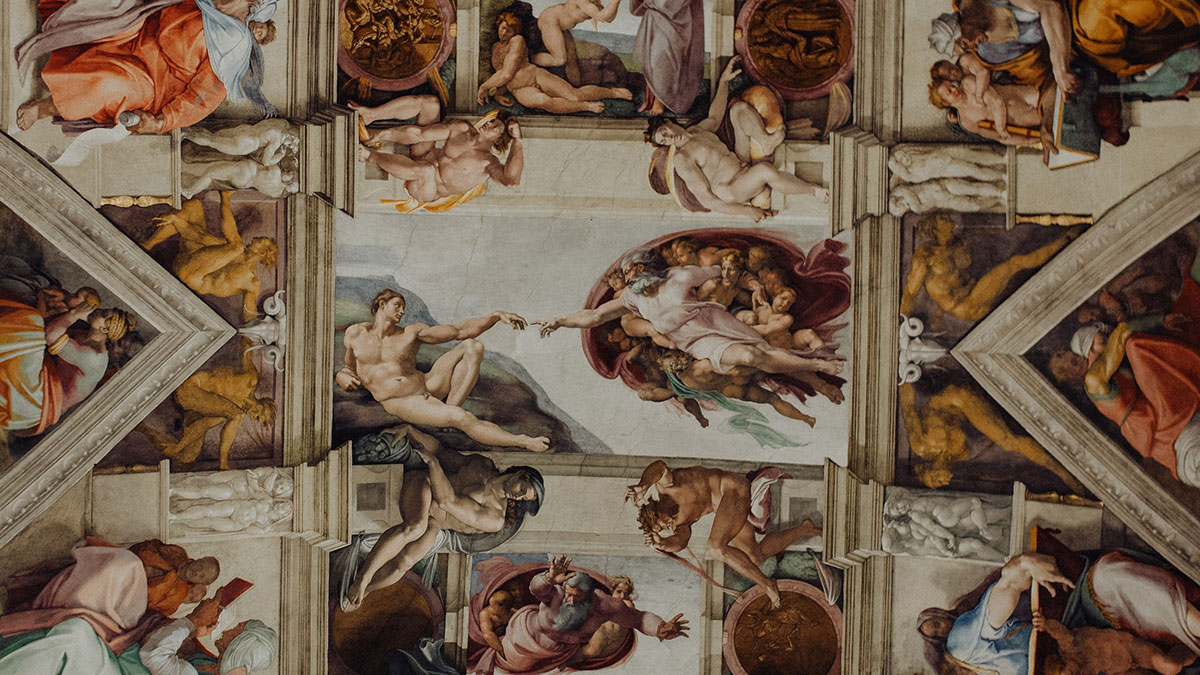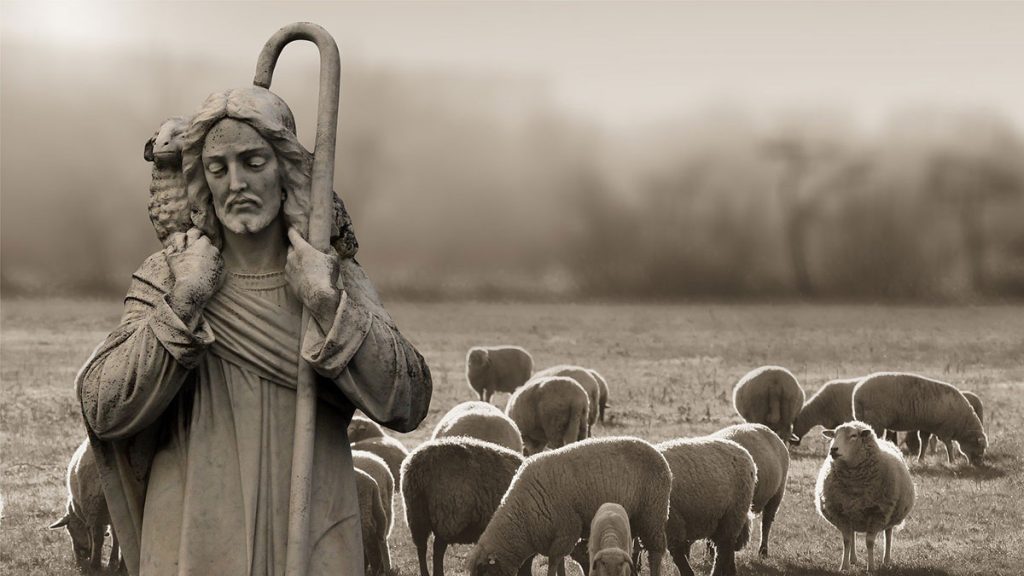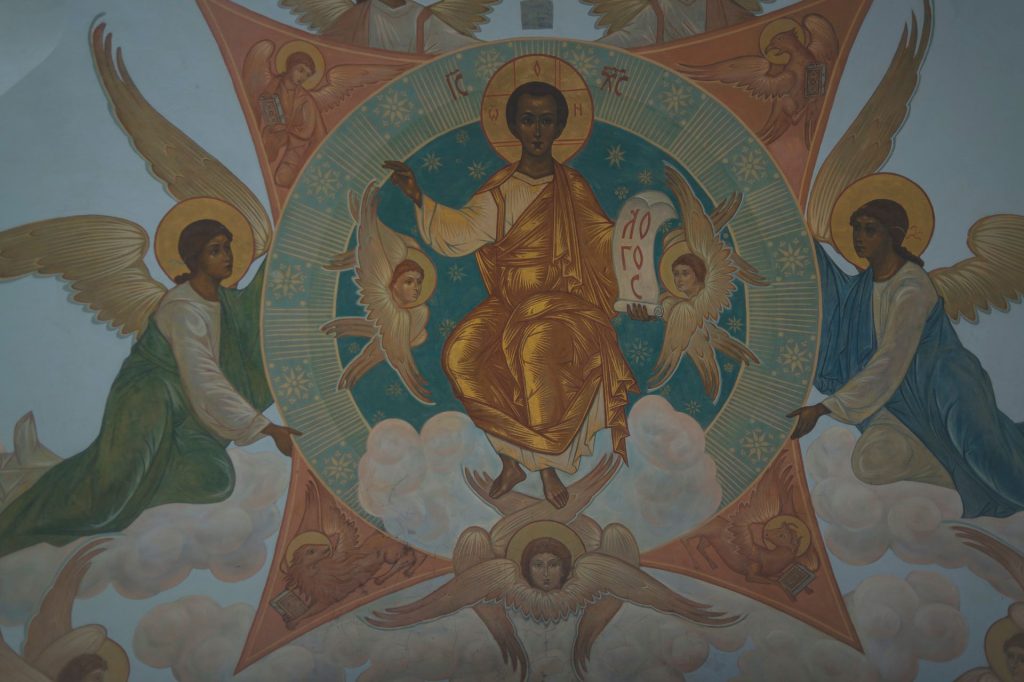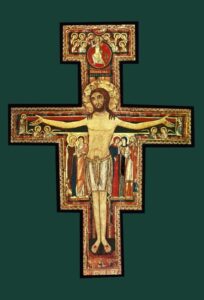“One God and Father of all, who is over all and through all and in all.”
— Ephesians 4:6
Who is God the Father? God the Father is the first Person of the Trinity whose attributes are similar to what “father” means in the ordinary sense. The role of “father,” in a traditional sense, is similar to that of looking over the family, having children, being a provider, and a source of stability for the family unit. The role of “father” naturally has a life-giving element to it as well since the father has helped create by literally creating the life his children.
This ordinary notion of father points to the extraordinary of who God is. God is Father not just to one particular family — but to all of creation! God is creator not just of a few children, but of every living and breathing soul! God is provider, not just in a material sense of “bringing home the bacon,” but literally providing absolutely everything the person needs (spiritual, material, physical). In fact, mystics like St. Faustina have testified over and over that we do not receive because we do not ask. Christ encourages us that when we ask we shall receive — so have faith!

Father: First Person Of The Trinity Revealed
Of all three Persons of the Holy Trinity it is God the Father who first reveals Himself to us. Specifically, God reveals Himself in the creation accounts of Genesis 1 and 2 and portrays particular characteristics that allow us to know Him better. His role as Father continues on throughout all of scripture but these early accounts are very telling as to who He is and what He is like. The early stories in the book of Genesis present a unique and raw moment in which we have a “front row seat,” so to speak, of the Creator at work – a critical moment where we have a first hand look at what this Creator is like and who He is. God dares to reveal Himself in and through His creation and it is through the works of His hands that we can come to know Him.
God Reveals Himself as Close, Intimate, and The Maker of Heaven and Earth
In Genesis 2 we read of God walking and talking freely with creation. He is not far away, cold, and distant, but close and personal. God reveals Himself as immanent or personal and able to freely communicate with in prayer. He speaks with his creation and there is even a playfulness or lightheartedness between the intimate connection God has with creation. There is little to no notion of God being a dominant tyrant, a scary figure, or something we should be deeply afraid of. Instead, there is a tender and innocent relationship between the Father and his creation.

God The Father And Creator Of Our Very Image
Yet how is it that God reveals Himself particularly as Father? Put simply, God’s role as Father is made clear in the very language that is used within Scripture to reveal Him. Specifically, we read that God made humanity in his very image and likeness:
“God created man in his own image, in the image of God he created him.”
— Genesis 1:27
This notion of being made in someone’s own image is familial in language. I.e., in what other relationships in our lives do we carry someone else’s very image and likeness within our own identity? Who are the particular persons that created us in their own image to the point where we might have their same eye color, hair color, crooked finger, or similar physical makeup? Regardless of the relationship we may or may not have with our own parents – our own image was literally created from their image. Genetically speaking, this is the very basis of how creation works and how offspring are put into motion.
So when God reveals that He created humanity in his very image, this is no accident, in fact, this is the very heart of our identity of Christians: we are children of God. This is the relationship originally created by God in the beginning and is the very identity that Christ came to restore by His calling out of God as Abba or Father (Mark 14:36).
This reality of God as Father is of critical importance to the Catholic faith for a couple of reasons. For one, it immediately washes away this notion of God being a ruthless tyrant and, instead, replaces it with the divine truth that God created us intimately and desires a closeness with us – similar to that of a father. We can put to the side any notion that God created us and then left us forsaken to figure things out on our own.
We can instead be anchored in the truth that God reveals His identity first as Father so that our own identity may be founded first by being God’s own beloved children. We are not aimless wanderers in this life but we are claimed and known by God. This foundation of our identity as children of God is the very crux of what it means to be a Christian and what it means to seek a relationship with God.
The reality of God as Father is also of critical importance because it immediately instills inherent value within all human life from the moment of conception. It is very clear in the creation accounts that God did not create accidents, but instead, God created His very children to grow and live and be like Him. Like any good Father, God creates each of us with such incredible love, innocent passion, and endless vision for the excellent human being we are to become – yet this all begins at the moment of creation – the moment of conception.
It is from the genesis of creation and this notion of being God’s children that the Catholic Church holds firm to this fundamental belief that each and every person has inherent dignity and value, equally, without exception, and is to be treated as such throughout all stages of life. The king of a royal palace does not have more or less dignity than a mother or a teacher trying to make ends meet. A human being that is being trafficked does not have less inherent value than the elite of this world.
All humans are created with equal dignity and value and all are created with inherent worth. The worth is inherent or naturally embedded; it is not “earned” or “deserved” through our own efforts. This inherent worth of the human being is not conditional. It does not depend on how virtuous the person is or is not. The human person contains unconditional value simply because of who we are in God’s own image – we are living, breathing, sacred images of God. The reality is this: we are all created in the image of God and so therefore we are all created with inherent value, period.
So when God reveals Himself particularly as Father it is of critical importance for all of creation. Imagine if he revealed himself as master puppeteer! What a horrid reality that would mean for us and the implications of us merely being puppets. Thank God this is not who God IS – instead we can find great comfort that in His most raw and beautiful revelation, He reveals himself with the fullness of love and truth, He reveals Himself as Father.

God, The Father, Becomes The Model For All Fathers
God is not just any Father and God is certainly not limited to an earthly father with shortcomings and imperfections. God is the greatest image of a Father we could ever imagine – beyond our wildest dreams. In fact, God is the most perfect example of what a father is: God is a GOOD, GOOD FATHER. God desires to give us the desires of our heart just like any loving father would! God desires our joy, our freedom, our fulfillment, our happiness — because this is what a good father desires for his children. God is the epitome of all of this and more.
The Father desires to fill our hearts with good things
And so when Catholics profess that we believe in God the Father we are referring to all of this: creator, life giver, provider, care-taker of our wants and needs, stability, consistency, etc. And yet while all of this beautifully and accurately describes the first Person of God, it still falls short because language will always fall short when it comes to the incomprehensible nature of God.
If this concept of God as Father seems too basic, or even too complex, take heart. Take this title of Father to prayer, let it resonate, digest it, and let it come to life within your own heart. Notice what stirs within you when you let this Person of God as Father settle within your bones — does it stir up hope or disappointment and why? Sit with that.
Let God the Father reveal Himself to you. There is no rush to perfectly comprehend this in a day or even a lifetime. God is good and, like a good father, He is patient and willing to wait on you as you discover His love.
Arguments And Insights In Regards To The Role Of Father
Below are some questions or even concerns that tend to be raised when the discussion of God as Father is discussed. There is no judgment or criticism here because, truth be told, the title of “father” can mean a lot of different things for different people. Of all the titles within the Trinity, “Father” can be the most easily misunderstood simply because we can be so quick to relate this title to our own limited experience of Father. So here are a few or those concerns:
What about dads who do NOT fill this “cookie cutter” traditional idea of “father?”
GREAT question and one, honestly, I wish was not an issue, but it is. Dads fall short all the time of the responsibilities that come with parenthood — as do Moms! Sometimes it’s intentional, accidental, or simply due to total immaturity or personal blindness. These ways might be small (like being late to pick up your kid after school) or monumental (divorce, separation, abuse, infidelity). This is reality. Yet the faith teaches that we must have courage to avoid the temptation of reducing God to our wounds or limited experiences. This can be very hard to do but this is the daily call we have
So how do we reconcile a messy reality with this “perfect” notion of God as Father? Is this title out of touch?
The key is this: the faith does not change the eternal understanding of God based on how the temporary and fluctuating understandings of “father “may or may not change in the culture. This is where culture and religion really draws a line in the sand and some natural contention may be at play. While culture is always in flux, religion (nearly all ancient religions, I would argue) exist to be the anchor in the midst of worldly changes — to be the stable constant in the background of an ever changing world. To some, this might seem out of touch, yet for millions of souls it’s this dynamic exactly that spurs hope in the faith: being able to find trust in something that’s constant in a world that very much is not.
So while it may be tempting to throw the title of Father out the window, the faith would encourage healing. Instead of breaking down the title of God as Father, the faith encourages that we heal and remedy the broken nature of our own relationship with fathers in our own life. In other words, instead of changing God according to ourbrokenness, let our brokenness be restored and transformed through the perfect love of God. Do not be tempted to reduce God to our wounds, but instead, bring our wounds to a great God who can restore all things.

Prayer
God, restore our understanding of Father. Heal the relationship in our own lives with fathers or father figures. We bring you our set-backs, misunderstandings, deep hurts we may have received from fathers. May you be our restored image of Father, provider, and creator. Awaken our hearts to the wonders of your love and reveal yourself to us today as Father. We trust in you. Amen.




